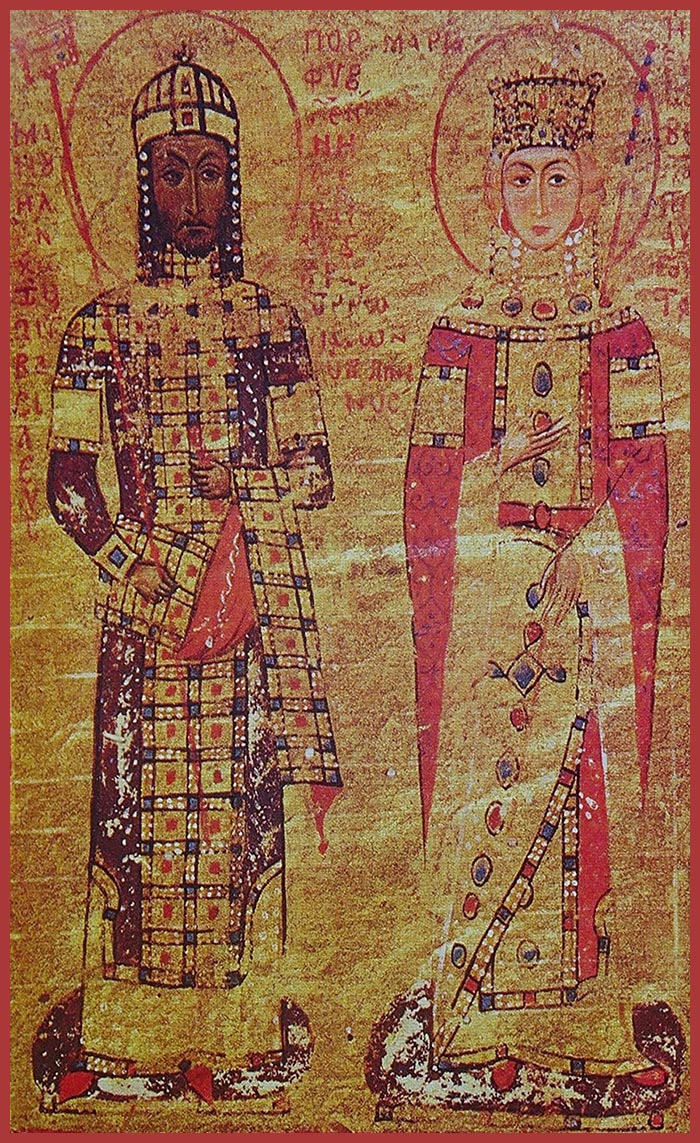
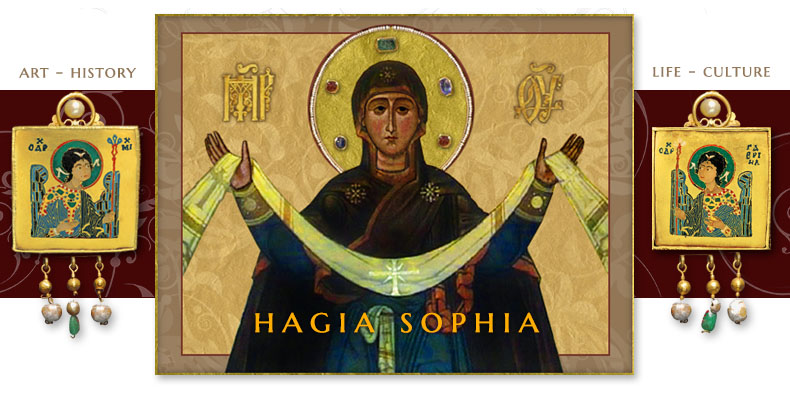
Marriage to Maria of Antioch and Birth of Alexios II
From O City of Byzantium by Niketas Choniates

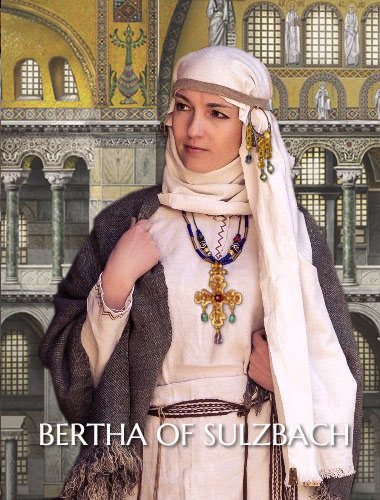
When Manuel's German wife died [end of 1159 or beginning of 1160], he grieved bitterly, looking upon her demise as if a limb had been torn from his body, and his lamentation was like the roar of a lion. He honored her remains with a magnificent burial, celebrating the funeral rites in the paternal Monastery of the Pantokrator. But after concluding the prescribed period of mourning as if half-dead and sundered in twain, he contemplated a second marriage because he desired to hear himself called the father of a son.
Letters from emperors, kings and princes throughout the world, as well as matchmakers, came to him. From all the candidates, Manuel chose a daughter of Raymond, prince of Antioch, the chief city of Coele Syria, which is watered by the Orontes and refreshed by a west wind. This Raymond was an Italian by birth, surpassing Priam with his goodly spear of ash. Members of the senate and the nobility were dispatched to escort the maiden back [summer 1161], and the nuptials were celebrated [Christmas 1161]. The woman was fair in form and exceedingly beautiful; her beauty was incomparable. In a word, she was like unto the laughter-loving, golden Aphrodite, the white-armed and ox-eyed Hera, the long-necked and beautiful-ankled Laconian [Helen], whom the ancients deified for their beauty, and all the rest of the beauties whose good looks have been preserved in distinguished books and histories....
 Thus did these events unfold. Since Manuel had not yet begotten a son [end of 1165 or beginning of 1166], he fixed the succession on his daughter Maria, whom his German wife had borne him, and bound everyone by sworn oaths to recognize Maria and her husband Alexios, who, as we have said, came from Hungary, as heirs of his throne and to submit and make obeisance to them as emperor and empress of the Romans after his death. While all others acknowledged the designated heirs and gave their sworn oaths as commanded by the emperor, Andronikos was reluctant, saying, "The emperor may be inclined to enter into a second marriage from which, presumably, he may beget a son, and by binding ourselves afterwards on oath to secure the throne for the emperor's younger offspring, we will be compelled to violate the oaths just taken on behalf of the emperor's daughter." He continued, "What madness is this of the emperor to deem every Roman male unworthy of his daughter's nuptial bed, to choose before all others this foreigner and interloper to be emperor of the Romans and to sit above all as master?" The emperor was not persuaded by this sound advice, taking Andronikos's words as idle prattle spoken by a man who was both contrary and obstinate. There were those who, after the oath-taking ceremony, made common cause with Andronikos; some declared on the spot their support of his views, while others argued that it was not to the advantage of either the emperor's daughter or the Roman citizenry to graft onto the fruitful and good olive tree the branch from an orchard of another species with the intention of girding others with power...
Thus did these events unfold. Since Manuel had not yet begotten a son [end of 1165 or beginning of 1166], he fixed the succession on his daughter Maria, whom his German wife had borne him, and bound everyone by sworn oaths to recognize Maria and her husband Alexios, who, as we have said, came from Hungary, as heirs of his throne and to submit and make obeisance to them as emperor and empress of the Romans after his death. While all others acknowledged the designated heirs and gave their sworn oaths as commanded by the emperor, Andronikos was reluctant, saying, "The emperor may be inclined to enter into a second marriage from which, presumably, he may beget a son, and by binding ourselves afterwards on oath to secure the throne for the emperor's younger offspring, we will be compelled to violate the oaths just taken on behalf of the emperor's daughter." He continued, "What madness is this of the emperor to deem every Roman male unworthy of his daughter's nuptial bed, to choose before all others this foreigner and interloper to be emperor of the Romans and to sit above all as master?" The emperor was not persuaded by this sound advice, taking Andronikos's words as idle prattle spoken by a man who was both contrary and obstinate. There were those who, after the oath-taking ceremony, made common cause with Andronikos; some declared on the spot their support of his views, while others argued that it was not to the advantage of either the emperor's daughter or the Roman citizenry to graft onto the fruitful and good olive tree the branch from an orchard of another species with the intention of girding others with power...
Since the empress was already in travail and about to give birth, the Purple Bedchamber was swept clean and meticulously prepared for the childbirth and the mother's reception. When the labor pains became acute, the parturient empress entered the Purple Bedchamber. The sight of the emperor, who was in attendance and anxious for his wife, eased her pangs; even more, he cast frequent glances at the stargazer, the gaper at heavenly signs. Since it was a male child that issued forth from the womb [14 September 1169 (1168?)], and the astrologer's art predicted that he should be blessed, a child of destiny, and successor to his father's throne, prayers of thanksgiving were offered up to God, and everyone applauded and rejoiced.
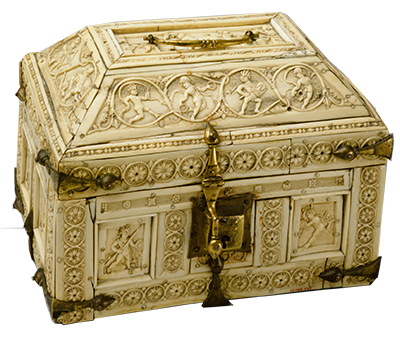 Celebrating the child's birthday and name-giving [22 September], Manuel, as is the custom among the Roman emperors, regaled the City's residents and named his son Alexios, choosing this name neither impulsively nor in honor of the grandfather's name, but taking heed of the oracular utterance in answer to the question: "How long shall the dynasty of Alexios Komnenos reign?" The oracular response was aima [blood]; if divided into letters and recounted in their order, the alpha clearly designated Alexios, the iota John [Ioannes], and the next two letters Manuel and his successor to the throne. As the boy increased in stature469 and shot up like a flourishing and luxuriant young plant, the emperor had another purpose to accomplish. He transferred to his son the oaths of allegiance that had earlier been pledged to his daughter Maria and her betrothed, the Hungarian Alexios [24 March 1171]. The emperor, his son, and those who were to pledge their oaths of allegiance to the latter entered the great and celebrated Church of the Mother of God in Blachernai. Having transmitted the dominion to the offspring of his loins by this ceremony of oath-taking, shortly thereafter he separated his daughter from Alexios and plighted his wife's sister,"' who had recently set out from Antioch with Baldwin, as his wife.
Celebrating the child's birthday and name-giving [22 September], Manuel, as is the custom among the Roman emperors, regaled the City's residents and named his son Alexios, choosing this name neither impulsively nor in honor of the grandfather's name, but taking heed of the oracular utterance in answer to the question: "How long shall the dynasty of Alexios Komnenos reign?" The oracular response was aima [blood]; if divided into letters and recounted in their order, the alpha clearly designated Alexios, the iota John [Ioannes], and the next two letters Manuel and his successor to the throne. As the boy increased in stature469 and shot up like a flourishing and luxuriant young plant, the emperor had another purpose to accomplish. He transferred to his son the oaths of allegiance that had earlier been pledged to his daughter Maria and her betrothed, the Hungarian Alexios [24 March 1171]. The emperor, his son, and those who were to pledge their oaths of allegiance to the latter entered the great and celebrated Church of the Mother of God in Blachernai. Having transmitted the dominion to the offspring of his loins by this ceremony of oath-taking, shortly thereafter he separated his daughter from Alexios and plighted his wife's sister,"' who had recently set out from Antioch with Baldwin, as his wife.




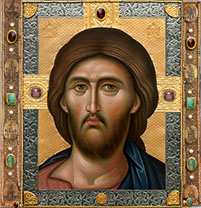 click here for icons of christ
click here for icons of christ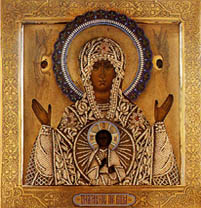 click here for icons of the theotokos
click here for icons of the theotokos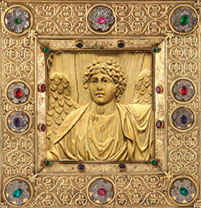 click here for icons of angels
click here for icons of angels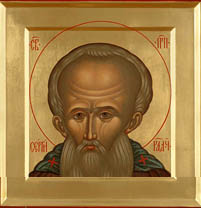 click here for icons of saints
click here for icons of saints








